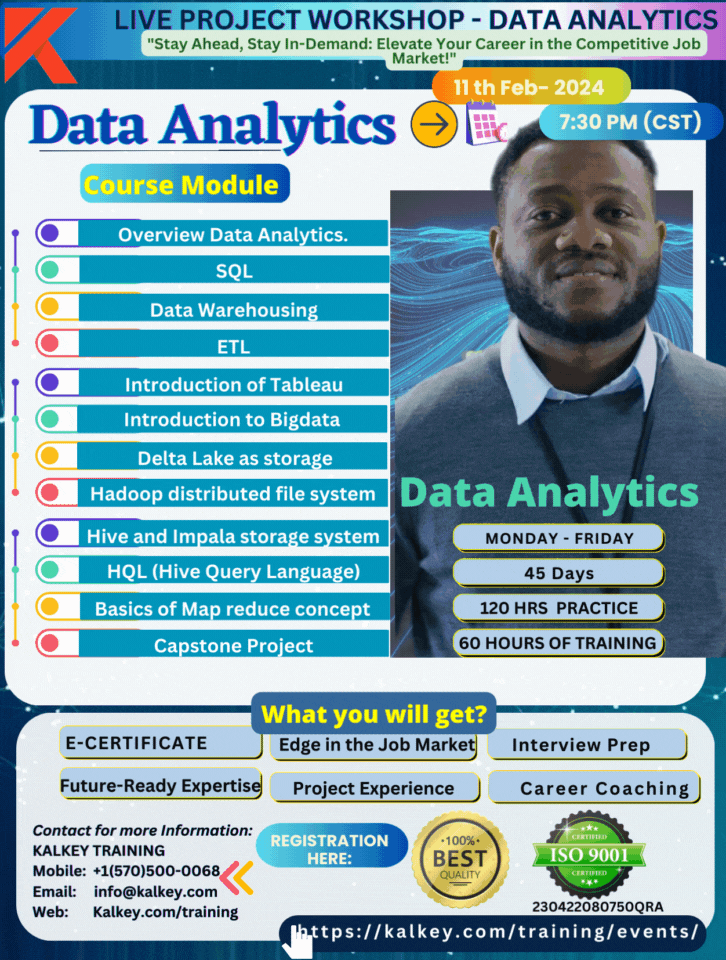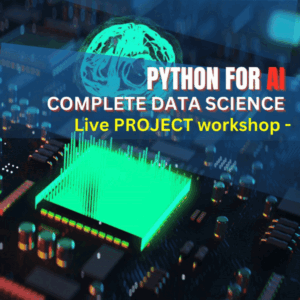Data Analytics & Engineering
Gain a master of the art of Data Analytics with our online course. Learn essential techniques to analyze and interpret data, uncover patterns, and make data-driven decisions. Develop valuable skills in data mining, visualization, and predictive modeling. Start your journey to becoming a data-savvy professional today!
Module 1:
1. Basics of SQL
2. Hands-on basic SQL
3. Advance Analytical SQL
4. Hands-on Advanced SQL
Module 2:
1. Overall Concepts of Data Warehousing
2. Types of SCDs are their Use cases
3. Different Architectures for Storing and Utilizing data
4. Use cases of OLTP and OLAP as per industry trend
Module 3:
1. What is ETL and Its role in Analytics?
2. Overview of ETL Tool- IICS (Informatica Intelligent Cloud Services)
3. Understanding the development with IICS
4. Understanding different types of transformations in IICS
5. Different Optimization strategies through IICS
6. 4 Hands-on practice sessions on IICS
Module 4:
- Tableau Basics
- Tableau- Use cases for Data Visualization
Module 5:
- Introduction to Big Data:
- Understanding the significance of big data in modern analytics.
- Exploring the challenges and opportunities associated with handling large datasets.
- Introduction to various tools and technologies used in big data analytics.
Module 6:
- Concept of Data Lake and Delta Lake as storage:
- Understanding the architecture and purpose of data lakes.
- Exploring Delta Lake as a reliable storage solution for big data.
- Benefits of using Data Lake and Delta Lake in managing and analyzing vast amounts of data.
Module 7:
- Hadoop Distributed File System (HDFS):
- Overview of Hadoop Distributed File System (HDFS) architecture.
- Understanding how HDFS stores and manages large datasets across distributed clusters.
- Exploring the key components and functionalities of HDFS for efficient data storage and processing.
Module 8:
- Hive and Impala Storage System:
- Introduction to Hive and Impala as storage systems for big data.
- Understanding the differences between Hive and Impala and their use cases.
- Exploring the advantages and limitations of Hive and Impala for data storage and querying.
Module 9:
- HQL (Hive Query Language):
- Learning the basics of Hive Query Language (HQL) for querying and analyzing data stored in Hive.
- Understanding the syntax and structure of HQL queries.
- Hands-on practice with executing HQL queries to retrieve and manipulate data.
Module 10
- Basics of MapReduce Concept:
- Introduction to the MapReduce programming model for processing and analyzing large datasets.
- Understanding the Map and Reduce phases and their roles in the MapReduce paradigm.
- Exploring real-world examples and use cases of MapReduce for data processing and analysis
Module 5:
1. Doubt-clearing session
2. Interview Preparation with Assignments



